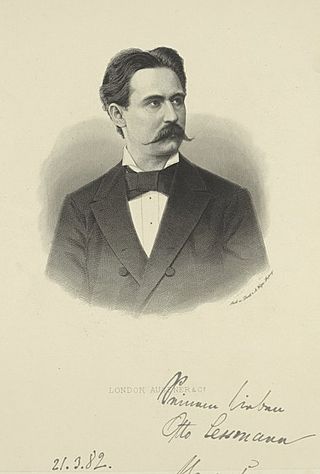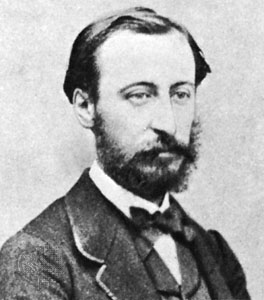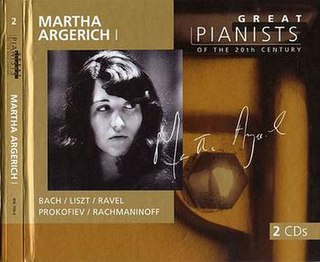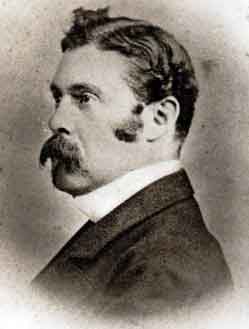
The Rhapsody on a Theme of Paganini, Op. 43, is a concertante work written by Sergei Rachmaninoff for piano and orchestra, closely resembling a piano concerto, all in a single movement. Rachmaninoff wrote the work at his summer home, the Villa Senar in Switzerland, according to the score, from 3 July to 18 August 1934. Rachmaninoff himself, a noted performer of his own works, played the piano part at the piece's premiere on 7 November 1934, at the Lyric Opera House in Baltimore, Maryland, with the Philadelphia Orchestra conducted by Leopold Stokowski.

Theophil Franz Xaver Scharwenka was a German pianist, composer and teacher of Polish descent. He was the brother of Ludwig Philipp Scharwenka (1847–1917), who was also a composer and teacher of music.
Pyotr Ilyich Tchaikovsky's Trio in A minor, Op. 50, was written in Rome between December 1881 and late January 1882. It is subtitled À la mémoire d’un grand artiste [In memory of a great artist], in reference to Nikolai Rubinstein, his close friend and mentor, who had died on 23 March 1881. It is scored for piano, violin, and cello.

Nikolai Karlovich Medtner was a Russian composer and virtuoso pianist. After a period of comparative obscurity in the 25 years immediately after his death, he is now becoming recognized as one of the most significant Russian composers for the piano.
Sergei Rachmaninoff's Trio élégiaque No. 2 in D minor, Op. 9 is a piano trio which he began composing on 25 October 1893 and completed on 15 December that year. It was written in memory of Tchaikovsky, and was inscribed with the dedication "In Memory of a Great Artist". It was first performed in Moscow on 31 January 1894 by Rachmaninoff himself, the violinist Julius Conus, and the cellist Anatoli Brandukov.

The Piano Concerto No. 4 in C minor, Op. 44 was composed by Camille Saint-Saëns in 1875. It was premièred on October 31, 1875, at the Théâtre du Châtelet of Paris, with the composer as the soloist. The concerto is dedicated to Anton Door, a professor of piano at the Vienna Conservatory. It continues to be one of Saint-Saëns' most popular piano concertos, second only to the Piano Concerto No. 2 in G minor.
Violin Concerto No. 2 in D minor, Op. 22, by the Polish violin virtuoso, Henryk Wieniawski, may have been started in 1856, but the first performance did not take place until November 27, 1862, when he played it in St. Petersburg with Anton Rubinstein conducting. It was published in 1879, inscribed to his dear friend Pablo de Sarasate.
Sergei Prokofiev set about composing his Piano Concerto No. 1 in D-flat major, Op. 10, in 1911, and finished it the next year. The shortest of all his concertos, it is in one movement, about 15 minutes in duration, and dedicated to the “dreaded Tcherepnin.”
The Études-Tableaux, Op. 39 is the second set of piano études composed by Sergei Rachmaninoff.
Hyacinthe Jadin was a French composer who came from a musical family. His uncle Georges Jadin was a composer in Versailles and Paris, along with his father Jean Jadin, who had played bassoon for the French Royal Orchestra. He was one of five musical brothers, the best known of whom was Louis-Emmanuel Jadin.

Great Pianists of the 20th Century – Martha Argerich is the second volume of the Great Pianists of the 20th Century box set and is the first of two volumes dedicated to her. The album features music by the composers Johann Sebastian Bach, Franz Liszt, Sergei Prokofiev, Sergei Rachmaninoff, and Maurice Ravel. The works were recorded between 1967 and 1982.

Sergei Rachmaninoff's Sonata in G minor for Cello and Piano, Op. 19 was completed in November 1901 and published a year later.

The composer Sergei Rachmaninoff produced a number of solo piano pieces that were either lost, unpublished, or not assigned an opus number. While often disregarded in the concert repertoire, they are nevertheless part of his oeuvre. Sixteen of these pieces are extant; all others are lost. Ten of these pieces were composed before he completed his Piano Concerto No. 1, his first opus, and the rest interspersed throughout his later life. In these casual works, he draws upon the influence of other composers, including Frédéric Chopin and Pyotr Tchaikovsky. The more substantial works, the Three Nocturnes and Four Pieces, are sets of well-thought out pieces that are his first attempts at cohesive structure among multiple pieces. Oriental Sketch and Prelude in D minor, two pieces he composed very late in his life, are short works that exemplify his style as a mature composer. Whether completed as a child or adult, these pieces cover a wide spectrum of forms while maintaining his characteristic Russian style.
An organ concerto is a piece of music, an instrumental concerto for a pipe organ soloist with an orchestra. The form first evolved in the 18th century, when composers including Antonio Vivaldi, George Frideric Handel and Johann Sebastian Bach wrote organ concertos with small orchestras, and with solo parts which rarely call for the organ pedal board. During the Classical period the organ concerto became popular in many places, especially in Bavaria, Austria and Bohemia, reaching a position of being almost an integral part of the church music tradition of jubilus character. From the Romantic era fewer works are known. Finally, there are some 20th- and 21st-century examples, of which the concerto by Francis Poulenc has entered the basic repertoire, and is quite frequently played.

Nikolai Rimsky-Korsakov composed his Piano Concerto in C-sharp minor, Op. 30, between 1882 and 1883. It was first performed in March 1884 at one of Mily Balakirev's Free Music School concerts in St. Petersburg.

Marie-Alexis de Castillon de Saint-Victor was a French composer.
The Grand Piano Sonata in G major, Op. 37, was written by Russian composer Pyotr Ilyich Tchaikovsky in 1878. Though initially received with critical acclaim, the sonata has struggled to maintain a solid position in the modern repertoire. Nevertheless, the sonata has been recorded numerous times and is recognized as one of the composer's masterworks. It is dedicated to Karl Klindworth.
The Violin Concerto in G major, Op. 46, is the sole violin concerto by Anton Rubinstein.
Concertos from My Childhood is a collection of famous student concertos, performed by Itzhak Perlman. They are all important pieces in violin pedagogy for beginning to intermediate students. The orchestra is from New York's Juilliard School, where Perlman has been a professor since 1999.

The Piano Concerto No. 1 in B-flat minor, Op. 32, is a work for piano and orchestra completed by Xaver Scharwenka in 1876. The first performance was given on 14 April 1875 by the composer at the piano, under Julius Stern's direction. The work is dedicated to Franz Liszt.








